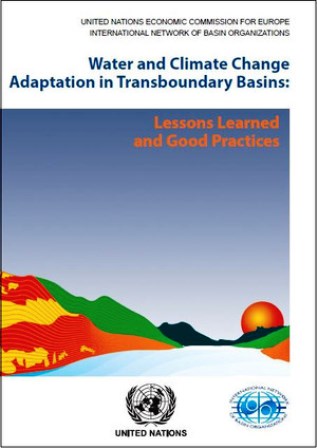Over 50 different experiences from river basins around the world have been compiled and analysed in the new publication “Water and climate change adaptation in transboundary basins: lessons learned and good practices”, prepared by the United Nations Economic Commission for Europe (UNECE) and the International Network of Basin Organizations (INBO) and launched today at the Seventh World Water Forum in the Republic of Korea (Daegu, 12–17 April 2015).
Both water and climate change know no borders. Currently, 276 transboundary lake and river basins cover nearly half of the Earth’s land surface and account for an estimated 60 per cent of global freshwater flow. Many of them are particularly vulnerable to climate change, which causes increased floods, droughts and waters scarcity, with cascading impacts on water health, biodiversity, agriculture, energy and other sectors.
Because of the complexity of climate change impacts on the water cycle — with impacts sometimes expressed in one part of a basin that are felt in far distant parts of the same basin — effective adaptation to climate change requires coordination, integration and coherence across political, sectoral, ecological and institutional boundaries. Transboundary cooperation in adaptation to climate change can enable the sharing of the costs and benefits of adaptation measures, promote their useful location in a river basin and prevent the possible negative effects of unilateral adaptation measures.
In the past, most adaptation efforts were focused on the national level but recently, more and more transboundary basins, especially those with basin organizations, have started addressing climate change adaptation from the transboundary perspective. Several major river basins, such as the Danube, Dniester, Mekong, Neman and, most recently, the Rhine, have developed adaptation strategies or are in the process of doing so.
The 58 case studies and 63 lessons learned presented in this new publication cover a variety of subjects, such as legal framework for adaptation in transboundary basins, information and data needs, impact and vulnerability assessment, developing and prioritizing adaptation measures, financing, evaluation, communication, capacity-building and stakeholder involvement.
Some key messages from the publication, illustrated by case studies from basins around the world, include:
· Transboundary cooperation on adaptation can trigger or promote cooperation also at a political level.
· Transboundary cooperation can enable more efficient and effective adaptation, by pooling available data, models, scenarios and resources and enlarging the planning space for locating adaptation measures.
· A flexible legal framework, such as a transboundary agreement, can support the development and implementation of adaptation strategies and measures.
· A vulnerability assessment is especially important at the transboundary basin scale, as reducing vulnerability in one part of the basin can affect vulnerability elsewhere in the basin.
· It is important to ensure synergies and linkages between adaptation actions at different government levels (local, national, regional, transboundary) and between different (economic) sectors.
The publication is available at:
http://www.unece.org/env/water/climate_change_publication.html
Notes to editors:
The publication was produced in 2014–2015 by a drafting group composed of experts from different countries and organizations working on water and climate change adaptation under the UNECE Convention on the Protection and Use of Transboundary Watercourses and International Lakes (Water Convention). The Task Force on Water and Climate was entrusted with the elaboration of the publication in cooperation with INBO and many other partners. The development of the collection of lessons learned and good practices was also an outcome of the Sixth World Water Forum (target 3.3.2).
The publication intends to compile, analyse and disseminate experiences, and thereby to demonstrate and illustrate important steps and lessons learned as well as good practices to take into account when developing a climate change adaptation strategy for water management in the basin or transboundary context. It includes lessons learned and good practices mainly from the programme of pilot projects under the implemented since 2010 by UNECE in cooperation with partner as well as from the UNECE/INBO global network of basins and numerous other organizations working on this topic.


